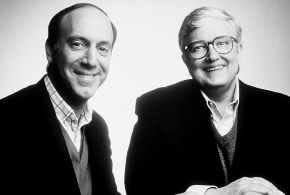Author of new 'Siskel & Ebert' book to visit Drexel Theatre in Bexley

- Oops!Something went wrong.Please try again later.
- Oops!Something went wrong.Please try again later.
Among the ranks of famous movieland duos, there are Bogart and Bacall, Gable and Lombard and Abbott and Costello, among others.
Even though they never made a movie, Siskel and Ebert surely belong on the exalted list.
Gene Siskel (1946-1999) and Roger Ebert (1942-2013) were newspaper movie critics—Siskel for the Chicago Tribune, Ebert for the Chicago Sun-Times—who moonlighted as the hosts of an iconic movie review program. Under various titles and in various incarnations, “Siskel & Ebert” was broadcast from 1975 through Siskel’s death (though successor programs, with and without Ebert’s involvement, continued through 2011).
Through their “thumbs up/thumbs down” formula — and their own ardently expressed debates and disagreements — Siskel and Ebert amassed power in the industry and held great sway with moviegoers.
Brooklyn-based film critic Matt Singer has written a new book about the critics and their show, “Opposable Thumbs: How Siskel & Ebert Changed Movies Forever.” Singer, 42, offers both a captivating biography of the critics as well as a compelling cultural history of the program.
In an event sponsored by Gramercy Books, Singer will appear at the Drexel Theatre in Bexley on Monday for a discussion with theater director Jeremy Henthorn. Ahead of the event, Singer spoke by phone with The Dispatch.
Movies: Columbus Jewish Film Festival to feature tribute to Gene Wilder
Question: Did you grow up watching 'Siskel & Ebert'?
Matt Singer: It was around middle-school age when I discovered the show. I don’t know the first time I watched it or how I discovered it. What I do remember, however I found it, is being totally obsessed with the show once I did. It was appointment-viewing for me. Growing up in New Jersey, the show was on at odd hours. ... I would tell my parents, “All right, I’m going to bed. Good night, mom and dad!” and lie in bed with the lights off and force myself not to fall asleep, stay awake, wait until midnight, turn the TV back on at the lowest possible volume so (my parents) wouldn’t hear when Gene and Roger started yelling at each other.
Q. Siskel and Ebert were not the only movie critics on TV. What was it about them that separated them from the pack?
Singer: It had a lot to do with their off-screen relationship, which was at times quite heated, confrontational and competitive. They figured out a way to turn that into a television show and an on-screen relationship. It did take a while. They were not an immediate sensation. In the early years, the success of the show was due in large part to the fact that it was a novelty to have a whole show dedicated to the movies and to show so many clips from the movies. We’re talking about the mid- and late 1970s when there is no YouTube — there’s no personal computer! VHS tapes, basically, don’t exist yet. ... So the show, in the early days, was this place where you could go watch clips from movies and find out what’s playing in town.
Q. How, then, did Siskel and Ebert ultimately capture their free-form arguments on air?
Singer: They said that the real turning point was essentially becoming so fed up with the way they were doing the show, which was very rehearsed and very scripted. They sometimes would use note cards and they would do take after take, and it was resulting in a show that was very polished but very stiff. ... They got fed up with that process, and there was a blow-up on set over it, and the end result was they were allowed to try to do the show a little differently. Instead of rehearsing, and over-rehearsing as they felt, they would be more spontaneous. That cross-talk, after the scripted review, felt spontaneous because it was spontaneous. Whenever possible, they wouldn’t know what the other was going to say.

Q. At their peak, how much influence did Siskel and Ebert have? How sought-after were the 'two thumbs up' ratings by studio marketing departments?
Singer: At their peak, they were a big deal. In the very early 1990s, Entertainment Weekly did the “power list” of the 100 most powerful people in Hollywood, and on this particular list, Siskel and Ebert — together, as one entry — was number 10 out of all the people in Hollywood. ... Michael Eisner, who was the head of Disney, the company that was distributing “Siskel & Ebert” at the time, ranked ahead of them, but Jeffrey Katzenberg, who was also one of the major executives at Disney at the time, was below them!
(At the time), they had just come off this very highly publicized incident where Fox banned them from all of their movies because they had gone on “Regis and Kathie Lee” and made fun of “Nuns on the Run,” a schlocky comedy from Fox. Fox was furious and said, “That’s it, you’re banned!” They said, “We don’t care . . . we’ll go pay to see your movies in a theater and we’ll review them that way.” . . . The end result was the ban lasted a matter of weeks. It was seen as the studio had caved.
Q. In writing the book, did you view every episode? Did you immerse yourself in the show?
Singer: I certainly watched every episode that was available online at the time I was doing this. There were a few episodes, here and there, that were not available. ... But I would say (I watched) upwards of 95% of them.
Reading: New book captures Ohio native's journey to becoming first Black woman jockey
Q. At the end of your book, you have a list of Siskel and Ebert’s 'buried treasures' — off-the-beaten-path films that they loved, including 'The Man in the Moon,' 'Mr. & Mrs. Bridge' and 'Living Out Loud.'
Singer: That really came out of watching so much of the show. When I’m watching these episodes, there are lots of movies that I’ve heard of because they are famous as the classics of the era, or maybe they are famous as the bombs of the era. I expected that there would be some movies that I hadn’t heard of, but I expected those to be the middling, mediocre things that weren’t worth remembering or talking about. What surprised me was how many movies there were that they really loved that I hadn’t ever seen, and in some cases had never even heard of. ... In terms of picking the movies that are (on the list), as I was watching (the episodes), I kept an ongoing list of those sorts of movies — the forgotten movies that they really liked. Then I started watching them myself. The 25 that are in there are all Siskel and Ebert favorites — two thumbs up — but I liked them, too.
Q. Why did none of the post-Siskel — and, eventually, post-Ebert — iterations of the show quite work? 'Ebert & Roeper,' with Richard Roeper replacing Siskel, went on for a number of years, but all of the versions after Siskel died had limitations.
Singer: It’s such a simple idea for a show, and the people involved (in the subsequent versions) were talented critics. A.O. Scott and Michael Phillips are two very good film critics, to name just one example (of hosts who replaced Siskel and Ebert). Someone else should be able to do this format. All of those different versions of the shows had good parts about them, and none of them, I don’t think, lived up to “Siskel & Ebert.” . . . I do think some of it was the fact that Siskel and Ebert had that unusual relationship where they were competitors before the show. It wasn’t like they were selected at random from different areas of the country. They knew each other, they had that combative relationship, so that gave that drama and tension.
Q. What is the legacy of Siskel and Ebert?
Singer: I consider myself part of this generation that is almost like the children of Siskel and Ebert — this generation of people who grew up and really discovered movies and film criticism through the show, and it became their gateway into either pursuing film criticism as a career, in some cases pursuing filmmaking as career, in some cases just being a more educated movie lover.
tonguetteauthor2@aol.com
At a glance
Author Matt Singer will participate in a conversation with Drexel Theatre director Jeremy Henthorn at 7 p.m. Nov. 6 at the Drexel Theatre, 2254 E. Main St., Bexley. Admission is $10 (waived with the purchase of Singer’s book). For more information, visit https://www.gramercybooksbexley.com.
This article originally appeared on The Columbus Dispatch: Author Matt Singer to visit Bexley to discuss 'Siskel & Ebert' book

